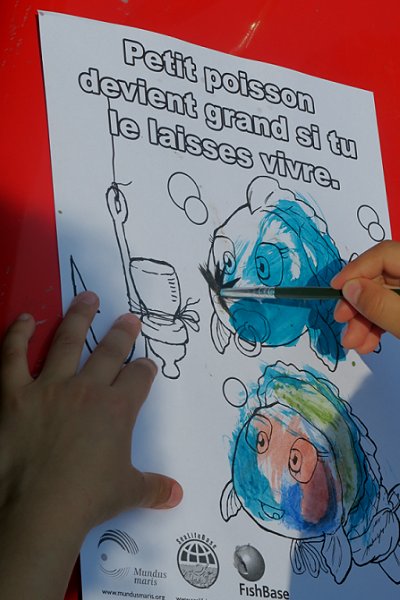Sunshine and lots of interested people at the Mundus maris stand
 Mundus maris in Brussels kicked off the series of events it organises together with its Clubs and partners in different countries to celebrate World Oceans Day 2016.
Mundus maris in Brussels kicked off the series of events it organises together with its Clubs and partners in different countries to celebrate World Oceans Day 2016.
The Environment Festival in the 50aire Park in Brussels on Sunday, 5 June, was the perfect venue to attract attention to this year's Motto "Healthy Ocean, Healthy Planet".
Next to the Brussels Aquarium, always a magnet for people interested in aquatic life, Mundus maris offered information about the oceans, major threats and things to do for all age groups and tastes.
We offered an info sheet in EN and FR summarising updated key facts with an outlook on how people can take action and connect to the ocean.
Lots of people took the associated quiz to test their knowledge about the ocean and win a beautiful cup with the Mundus maris mascots Samba and Kumba. Perhaps some of you will remember that the Mundus maris Club at the mid-level school in Kayar, Senegal, wrote up the nice naming story, which was later also turned into a video on our YouTube channel.
Meanwhile the kids had a hey day with water colours and the mascot sheets so that the parents had a few minutes respite and could breathe through as Samba and Kumba turned blue, red, green and bright yellow or dark violet and even black.
The sunny weather and the multi-lingual staffers at the stand made it easy for the many visitors to stop for a conversation in their native language, discover the latest news about the major threats to the ocean and what can be done. First among these is overfishing aggravated by significant levels of misreporting, illegal fishing and fraudulent labelling. Visitors were grateful to discover that MM and others have already developed fish rulers for several countries and distinct regions of the ocean so as to empower consumer choice and use them also for teaching early on in schools. The extent of under-reporting by governments is a source of great concern, because it means that real extractions are on average about 50% higher than the global stats FAO compiles on the basis of what is officially reported. Worse, particularly industrial catches are shrinking since 20 years, while small-scale catches, mostly ignored by officialdom, keep increasing. Investing into better recordings would enable more realistic and sustainable policies and investments.
 The threats to turtles, marine mammals, fish and birds constituted by millions of plastic bags in the ocean is thankfully now becoming better understood after numerous campaigns and initiatives to ban their use in super markets and elsewhere. The animals mistake the bags for jellies and can suffocate or die from starvation with a stomach full of plastic.
The threats to turtles, marine mammals, fish and birds constituted by millions of plastic bags in the ocean is thankfully now becoming better understood after numerous campaigns and initiatives to ban their use in super markets and elsewhere. The animals mistake the bags for jellies and can suffocate or die from starvation with a stomach full of plastic.
Plastic pollution has many other facets and chosing sunscreens and cosmetics without microbeads and generally work on upstream prevention are increasingly understood as good ways to reduce the threat.
Fewer people were aware of other forms of pollution, notably overfertilisation of coastal and enclosed seas from industrial agriculture and untreated urban waste. Yet most of the hundreds of sites which are now dead, are expanding.
Climate change has its own creeping effects, which can already be observed and measured: warming accelerates sealevel rise that has already led to submersion of four islands in the Pacific. Acidification is of potentially even greater concern in the shorter run as marine organisms with calcareous skeletons need more energy just to keep their bodies together. A simple experiment at the MM stand illustrated how acidification dissolves marine shells. The probably least known effect of climate change is that warming waters means less dissolved oxygen so that lots of active organisms have already started moving polewards because they are gasping in the tropics. Together these amount to a triple whammy, which should strengthen the resolve to act, and fast. Switching to renewable energies is more urgent than ever.
So, it is of great concern that the shipping industry's first timid attempts at cutting its exhorbitant greenhouse gas emissions are already faltering. They have lobbied successfully to stay out of all climate negotiations, including the Paris Climate Summit in December 2015. On such bad precedents, the fossil industries are forging ahead with attempts at new exploitations affecting the ocean as if the climate summit had never taken place!
At the end of a busy day lhe results of the quiz were announced - the five Mundus maris cups will remind the winners every day, how important and urgent it is to protect the ocean for real. The answers for the quiz are available here.


























